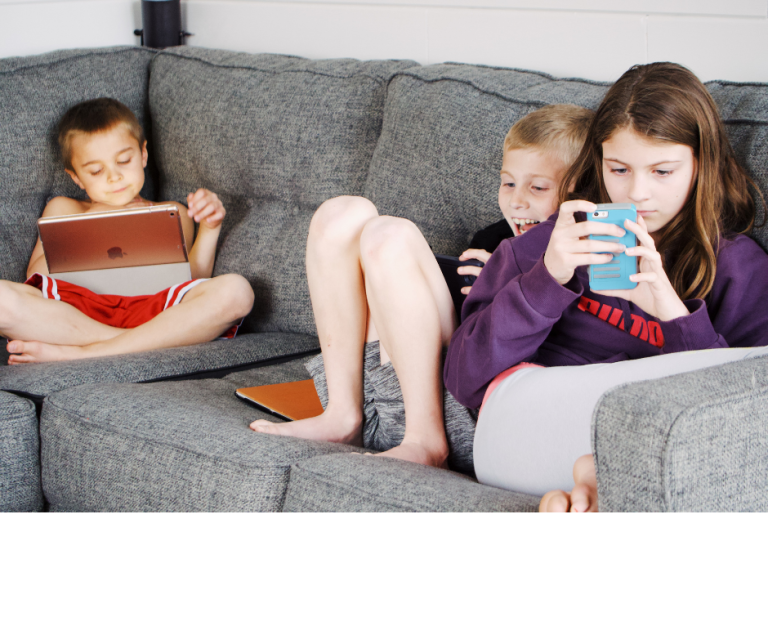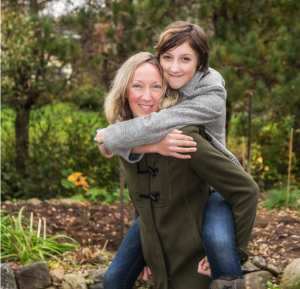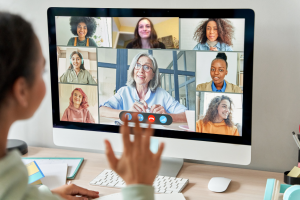
We think yes… and no!
When smartphones were invented 15 years ago, they seemed like a great idea – at first. We could work on-the-go, connect, watch videos, find our way, and we had Google in our pocket. All very appealing for most, but not good news for our children. Smartphones are inadvertently damaging their mental health. Depression and suicide in children has rocketed since 2012. Why? Well, researchers have concluded that it’s a lot to do with the impact on children of having a smartphone and exposure to social media.

How bad is it?
Right now, 97% of 12-year-olds in Britain have a smartphone, showing us how important it is to focus on this issue, especially as 92% of UK parents think social media negatively impacts teens’ mental health. Parents didn’t grow up with smartphones and social media, so we’ve no model for how to introduce it safely into our children’s lives. That’s what we now have to figure out.
Social media apps are designed to turn a profit which they do by selling ‘our attention’ to advertisers – we are the product they sell! The more we can be tempted to watch and scroll, watch and scroll, the more money they make from advertisers. Addictive algorithms hook us in and keep us online. Our children are particularly vulnerable to the unregulated content which is designed to capture attention by creating longing or giving dopamine hits. Particularly since 2020 with the explosion of Tiktok, we’ve seen a rapid escalation in just how addictive the content has become. While Facebook and Instagram’s algorithms traditionally responded to the popularity of the person posting, Tiktok’s algorithm is more responsive to the user: it primarily relies on the different actions a user takes on the platform in real-time. If you ‘like’, ‘save’, or watch all the way through a video, the next video TikTok offers you will be similar. This reinforces your views, connects you with others who share your opinions, and then leads you down the rabbit hole of gradually exposing you to more extreme content, including themes of suicide and violence, in the platform’s attempt to keep you on the app. The evidence that social media and gaming is harmful to children is irrefutable.
When children create their own social media content, their self-worth becomes entwined with gaining likes and followers. Their self-esteem is further damaged by trolls posting negative comments and, at its worst, cyberbullying has led some teens, such as 14-year-old Mia Janin, to take their own life in despair. Unattainable beauty standards, particularly for girls, causes body confidence issues, and self-hatred. Filters, editing, and the dreaded FaceApp leads commenters to compare themselves negatively and wonder how an influencer’s skin looks so “perfect” not realising that it’s not real.
Social media has also led to children spending less time outside or with each other. Dr Vivek Murthy identified a 70% decrease in our young people spending time in person with friends from 2000 to2020 because they’re communicating across an app instead. Tweens tell us they feel more comfortable communicating by text than face-to-face. They’re losing the ability to strike up a conversation in person and are becoming socially reticent.
We can change this!
Those who care most about children’s well-being can protect them by acting collectively. Parents, grandparents, and those who work with children can gain influence by working together. Parents can communicate (using smartphones!) to agree age restrictions for phone use, to liaise with schools, and to petition parliament.
First steps
It’s too easy for our children of any age to open a social media account. While all social platforms have an age restriction, there’s no requirement to provide proof of age. So, let’s change that by making the social media companies responsible for policing their age restrictions. Recently Florida governor Ron DeSantis signed a bill that will ban under-14s from social media – and will remove any existing under-14 accounts from social media platforms. Any platform violating these rules will have to pay a fine of up to $50,000 – a great way to put pressure on these companies, hit them where it hurts.
Locally, what can we do? Daisy Greenwell co-founded Smartphone Free Childhood in the UK, which exploded in February 2024 with over 10,000 new members and counting, in regional groups across the UK. Daisy was inspired by a phone call from a teacher who plans to turn his network of 25 primary schools across the South West into smartphone-free schools by only allowing retro-style phones, no smartphones, and to make it a part of the uniform policy.
Author and Rites for Girls founder, Kim McCabe says: “It is possible to create a smartphone-free culture and to hold firm despite pushback from our youngsters. Now that smartphones have become such a generally accepted feature of our children’s lives, this will certainly take resolve, but parents are uniting as recognition is growing for the need to protect our children better. Parents and teachers can take a stand and lead the way. First, we check our own smartphone use. We cannot ask children not to do what we are doing. For the adults: no phones at mealtimes, or in classrooms, phones left downstairs at bedtime, apps installed to limit social media use. First, we reduce our addiction; we model healthy phone use, and only then can we insist that our children follow our lead. ’Social media breaks’ and ’digital detoxes’ have been on the rise in recent years, as we all recognise how rarely we find our mood improved by time spent on social media and yet how hard it is to put down.”
“In addition to reducing time online, we also need to teach our children how to be healthy online. Just as we taught our children road safety, we must walk alongside them in the digital world too. So, again, first we need to learn how to do this ourselves. Preparing our children for a digital world has become part of our parenting job. While we want to keep them away from the destructive effects of social media for as long as possible while they’re young, we also need to prepare them for living with it as they grow up. It’s not all bad. We want them to have access, in as healthy a way possible, to the huge potential for learning, connection, and power to effect change. This is the adult’s role, to figure this out and be involved. Luckily there’s lots of free guidance online for how. Together we can do this.”
“Then look out for smartphone-free zones for your children. You can’t play football and scroll, you can’t be at drama club, or play in the garden or park, or ride your bike and scroll. At Rites for Girls our Girls Journeying Together groups are phone-free, and offer a safe place for girls to make friends, and learn what they need to know as they grow up to take care of their social, emotional and physical well-being.”
What could work for your family?
Is the answer going back to retro phones? Is it having smartphone-free Sundays? Is it collaborating with other parents to ensure children are often free from the clutches of their phones? We’re curious about what you think.
And if you’re a mother (or concerned adult) who wants to work with children and keep them away from smartphones, and you’re interested in learning how we’ve created smartphone-free spaces for girls, you can learn more about training with us here.



No comment yet, add your voice below!